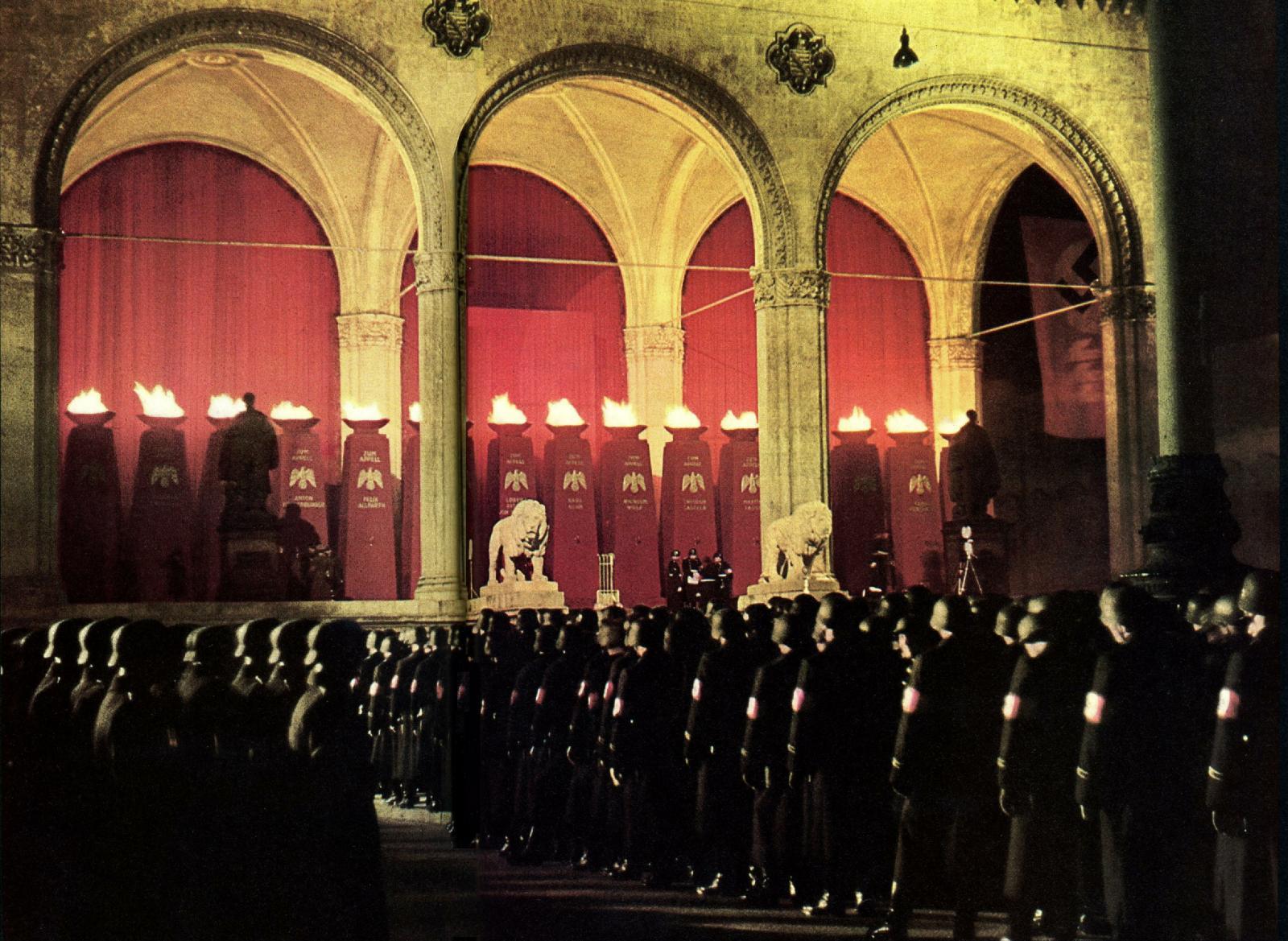HITLER AND RELIGION

The topic of Hitler and religion is a very important subject which has not been widely discussed. It's very strange that there hasn't been more research into this topic in light of the importance of Hitler as a modern historical leader. What can we say about Hitler and religion? It's actually quite a hard subject to follow. From what we can analyze from Hitler's speeches and Mein Kampf, it was clear he was not an atheist. Hitler believed in God. We could certainly say he was a deist, who repeatedly proclaimed himself as an agent of fate. More details and documentary information are below.
NOTE: BRIEF STATEMENT OF PUBLICATIONS PRINCIPLES
The World Future Fund serves as a source of documentary material, reading lists and internet links from different points of view that we believe have historical significance. The publication of this material is in no way whatsoever an endorsement of these viewpoints by the World Future Fund, unless explicitly stated by us. As our web site makes very clear, we are totally opposed to ideas such as racism and religious intolerance. Since our founding in 1995 we have devoted a major project, our Global Education Project, to support tolerance and respect among the peoples and religions of the world. However, in order to combat evils like racism, it is necessary to understand them by means of the study of key documentary material. For a more detailed statement of our publications standards click here.
HITLER AND HIMMLER
VIEWS ON ANCIENT GERMAN PAGANISM

One reason why the subject of Hitler and religion is very complicated to study is the apparent conflict between the views of Hitler and other major parts of the Nazi state such as the SS and Himmler. Now Himmler, the SS and other parts of the Nazi government had a very specific agenda: to recreate what they saw as German paganism. Now what that paganism was and what it was not is a subject that we detail somewhat on our report on Himmler and Religion, and we're not to get into all the details here. The point is that there is probably a dichotomy between Hitler and Himmler, because Hitler is recorded on numerous occasions ridiculing Himmler's attempts to revive paganism.
When you look at Hitler's discussions of art and culture, Hitler was very influenced by the neoclassical world. He always talks about how his world wasn't the dark mysteries of the cathedrals, but that it was the clear light of ancient Greece, the neoclassical architecture that he created via Albert Speer. It has to be considered important that none of the major Nazi building projects featured ancient German themes but instead copied the classical world of ancient Greece and Rome.
Below is a model of the Greek Parthenon.

Below is a part of Hitler's plans for Berlin.
HITLER'S WORSHIP OF NATURE
Hitler repeatedly stated his view of religion was a matter of respecting nature's laws. It is not an accident that Hitler's favorite place was his mountain home, the Berghof in southern Bavaria. Here he spent endless hours hiking in the mountains and admiring the spendor if the the Alps. Here is the spectacular view from the living room at the Berghof. The giant window could lowered into the floor presenting a direct view of nature.

POLITICAL REALITIES OF RELIGION IN NAZI GERMANY
The problem with accepting Hitler's disagreements with Himmler at a face value is that the SS was the core of the Nazi state. If Hitler did not agree with Himmler, it is incomprehensible to us that he would've allowed Himmler to evolve projects such as the Ahnenerbe, the castle at Wewelsburg, the whole structure of the SS, the whole structure of the Nordland Press, the whole structure of the propaganda campaign for paganism that Himmler conducted on a very high level through Germany, and the influence of all this into the Hitlerjugend (Hitler Youth) and the education system, in terms of educating German children about the Runes and other things like that. So if Hitler didn't believe in all this stuff, it seems very peculiar that he would set forth a program that supported it.
Our view is that Hitler's statements need to be taken with a great deal of reservation on that subject in light of Hitler's background in politics. Hitler was a German politician who observed German politics in Austria, particularly in Vienna with the rise of people such as Carl Luger in Viennese politics before World War I.
Both in Vienna and in Bavaria, where Hitler got his start as an active politician, the Catholic Church was of enormous significance. Hitler made the acquaintance of Ludendorff (the acting military dictator of Germany during World War I) in the world of Munich politics and watched Ludendorff and his wife present a campaign for paganism, the hatred of Christianity and so on. Hitler saw firsthand that even with somebody of Ludendorff's prominence, a campaign based on paganism was a political catastrophe of the first order. Hitler resolved from then on never to be associated with something like that. So Hitler was very sensitive to publicly keep on the good side of the church. So there are good reasons to believe that for public relations reasons, Hitler would publicly disavow a lot of what Himmler was doing, regardless of his own personal views on the matter. In the end, however, the matter of Hitler's views remains unclear in many ways.
HITLER'S PRIVATE HATRED OF CHRISTIANITY
Hitler hated Christianity. Like Himmler he saw it as a contradiction of nature. "Christianity is a rebellion against natural law, a protest against nature. Taken to its logical extreme, Christianity would mean the systematic cultivation of the human failure." (Hitler's Table Talk. p.51)
Hitler also stated, "The reason why the ancient world was so pure, light and serene was that it knew nothing of the two great scourges: the pox and Christianity." "In the ancient world, the relations between men and gods were founded on an instinctive respect. It was a world enlightened by the idea of tolerance. Christianity was the first creed in the world to exterminate its adversaries in the name of love. Its key-note is intolerance."
OFFICIAL NAZI POLICY TOWARDS CHRISTIANITY
In spite of Hitler's hatred of Christianity we think it is very doubtful that Hitler would have launched any kind of major campaign against the church even if Germany had won the war even though Goebbels suggested this in his diary. Hitler was a realistic politician. He would not do something that would plunge Germany into a very divisive struggle. So he would probably do more of what he had already done, which would be to further augment the influence of pagan ideology in the German education system. But we are very skeptical about the argument that he would abolish Christianity after the war. We do not think that was very likely. Hitler, like many politicians, was more pragmatic than he's been given credit for when faced with ideology versus practicality. It's not that he didn't have a deep commitment to ideology. He did. However, Hitler showed himself to be extremely flexible. The most extreme example of course was the Nazi Soviet Pact of 1939. He was determined not to have a confrontation with the church. Indeed the Catholic Center Party played a very important role in getting the final votes for the passage of the Enabling Act, which basically abolished democracy in Germany. Hitler made a great deal of effort to remain on good terms with the Catholic Church.
Hitler saw Christianity eventually collapsing. "The man who lives in communion with nature necessarily puts himself in opposition to the Churches. And that's why they're heading for ruin. Science is bound to win."
HITLER'S VIEWS ON OTHER RELIGIONS
We do know that Hitler greatly admired Islam and even expressed regret that Islam had not conquered Europe in light of his view that it was a superior religion. He also greatly admired Hinduism with what he interpreted as the racial aspects of Hinduism. Indeed, the racial ideology of Nazi Germany was directly related to ancient ideas from India. (See our report.)
Hitler and Himmler both admired Japan. “The fact that the Japanese have retained their political philosophy, which is one of the essential reasons for their successes, is due to their having been saved in time from the views of Christianity.” (Hitler’s Table Talk, p. 393)
CONCLUSIONS
So the question of Hitler and religion is definitely one that deserves further research. But it may be one of those questions in history where the trail ends in the mists of the past, that there may not be a definitive point of view. But suffice to say, that he did believe in God, he did see himself as an agent of God, and he connected that to the system of ideology that he promoted.
RELATED WORLD FUTURE FUND REPORTS
Hitler's speech at Nuremberg in 1936
Wagner
Hitler, Wagner and His Concept of Political Prophecy
General Nazi Germany
Hitler Speeches: Some Complete Transcripts
Hitler: Problems in Documentary Record German Edition Klicken Sie hier für Deutsch
Nazi Germany Documentary Sources
WFF Guide to Hitler and Himmler Audio Recording
NATIONAL SOCIALISM AND RELIGION
VIDEOS
"Geheimnis Tibet" Schutzstaffel Expedition to Tibet Film
National Socialism and Ancient Paganism: Schwarze Sonne Videos
ANCIENT PAGANISM AND NAZIS BOOKS
The Secret King: The Myth and Reality of Nazi Occultism
The Secret King: Karl Maria Wiligut, Himmler's Lord of the Runes
The Occult Roots of Nazism: Secret Aryan Cults and Their Influence on Nazi Ideology
Hitler's Master of the Dark Arts: Himmler's Black Knights and the Occult Origins of the SS
GUIDO VON LIST
The Secret of the Runes: English Translation by Stephen E. Flowers (Book)
ANCIENT EASTERN INFLUENCE
Quotations on the Caste System From The Ancient Religious Texts of India
Hitler, Buddha and Krishna (Trimondi Online Magazine)
SAVITRI DEVI
Savitri Devi Archive: Woman Against Time
High Priestess: Savitri Devi, The Hindu-Aryan Myth and Neo Nazism
GERMAN PAGANISM